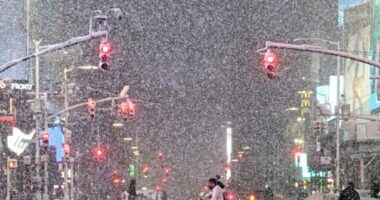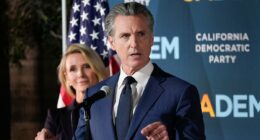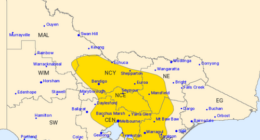Share this @internewscast.com

Supreme Court Justice Ketanji Brown Jackson has issued a temporary suspension on an order compelling the Trump administration to complete full Supplemental Nutritional Assistance Program (SNAP) payments for November by Friday.
This decision by Justice Jackson delays certain payments until the U.S. Court of Appeals for the First Circuit can review the administration’s request to halt the order during its ongoing appeal process.
The temporary stay does not address the fundamental legal issues of the case but offers the Trump administration a brief respite. The administration had approached the Supreme Court with an urgent appeal earlier on Friday evening.
“In light of the First Circuit’s representations, an administrative stay is necessary to allow for a swift resolution of the pending stay motion by the First Circuit,” Justice Jackson explained.
Justice Jackson was responsible for this immediate decision as she automatically handles emergency appeals from the First Circuit.
“Our legal team remains unwavering, working tirelessly to protect and promote President Trump’s agenda,” expressed Attorney General Pam Bondi on the social media platform X.
SNAP provides roughly 42 million people with grocery assistance, and the program’s funding lapse has become one of the most visible signs of the government shutdown as it stretches into a sixth week.
Cities and private groups sued the administration as the U.S. Department of Agriculture (USDA) announced the benefit would be cut off starting in November, the first time the program has dried up completely.
U.S. District Judge John McConnell initially ruled the administration needed to, at minimum, deplete a $5 billion SNAP contingency fund, rejecting arguments that it was only intended for hurricanes and other unforeseen emergencies.
But it is not enough to cover the full November benefits, and McConnell said partial payments would only be lawful if they could be provided expeditiously. States and the Trump administration have acknowledged the recalculations would likely spark weekslong delays.
So on Thursday, McConnell ruled the administration needed to move roughly $4 billion from child nutrition programs to fund the remaining gap for the November payments, sparking the administration’s last-minute appeal ahead of Friday’s deadline.
“If allowed to stand, this decision will metastasize and sow further shutdown chaos,” Solicitor General D. John Sauer wrote of the lower ruling.
A three-judge panel on the 1st Circuit declined to immediately intervene earlier Friday evening.
By the time the administration reached the Supreme Court, the USDA had already sent a letter to regional SNAP directors indicating it was working to comply and process the payments.
Ongoing shutdown, ongoing SNAP uncertainty
The lapse in SNAP funding has become a prominent, visible repercussion of the record-breaking government shutdown, which has left government employees without a paycheck sparked increased airline delays and halted certain government services.
One day earlier, U.S. District Judge John McConnell ruled the administration needed to provide full SNAP payments for November by Friday.
McConnell, an appointee of former President Obama, said administration’s plan to deplete an emergency fund and provide partial SNAP benefits for November wasn’t sufficient because of expected delays with the recalculations.
He ruled officials needed to tap a separate source of child nutrition program funds to fill the remaining gap.
“But it obviously was not unlawful for the agency to see things differently — and refuse to starve Peter to feed Paul, by gambling school lunches tomorrow in exchange for more SNAP money today,” Sauer wrote to the Supreme Court. “Indeed, that sort of hard tradeoff is precisely the sort of decision that Congress committed to agency discretion and placed beyond the reach of judges.”
A group of cities, churches, nonprofits and a union that challenged the lapse has argued McConnell’s ruling should stand.
“The district court did not abuse its discretion in concluding that their decision to make partial payments despite the attending weeks or months of delays was arbitrary,” they wrote in court filings.

















